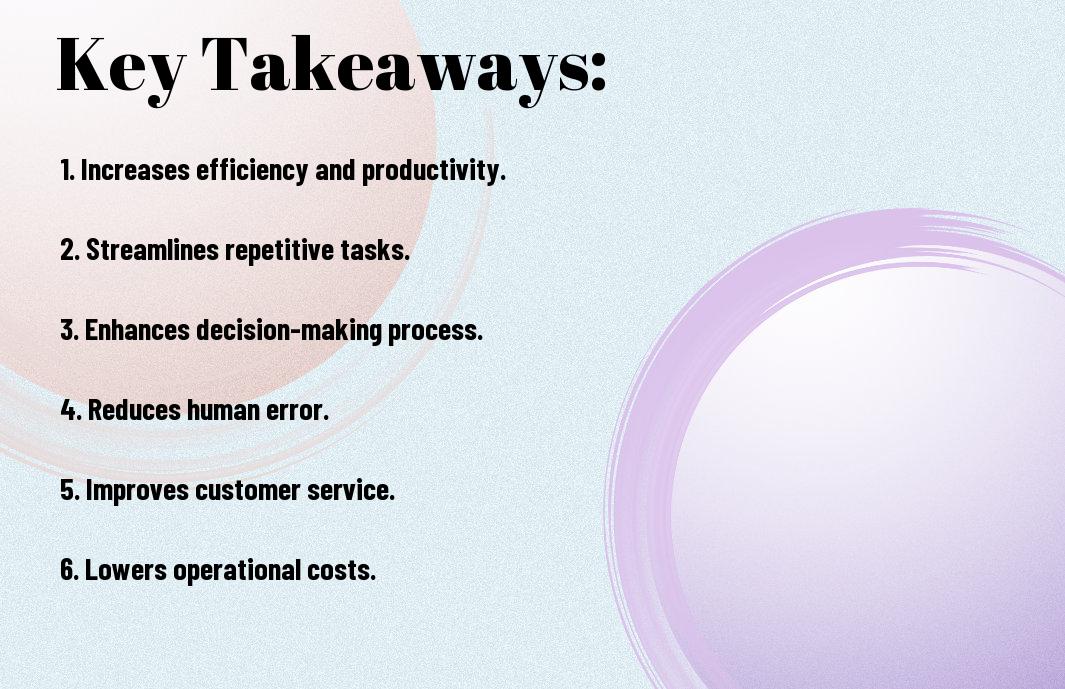AI Automation – A Game-Changer For Small Businesses
Business technology is evolving rapidly, and AI automation is at the forefront of this revolution, especially for small businesses. This blog post explores how AI automation is transforming the way small businesses operate, improving efficiency, reducing costs, and enhancing customer experiences. Discover how embracing AI automation can give small businesses a competitive edge in today’s fast-paced business landscape.
Key Takeaways:
- Increased Efficiency: AI automation can streamline repetitive tasks, allowing small businesses to focus on more strategic activities.
- Cost Savings: By reducing manual labor and human error, AI automation can lead to significant cost savings for small businesses.
- Improved Customer Experience: AI tools can personalize interactions, enhance customer service, and boost customer satisfaction levels.
- Data Analysis: AI automation can analyze large volumes of data quickly, providing valuable insights for decision-making and business growth.
- Competitive Advantage: Small businesses that embrace AI automation early on can gain a competitive edge in the market and stay ahead of the competition.

The Current State of Small Businesses
Limited Resources
Before venturing into the potential benefits of AI automation for small businesses, it’s crucial to understand the challenges they currently face. Small businesses often operate with limited resources, be it financial or human capital. This can make it difficult for them to scale efficiently, compete with larger corporations, and stay innovative in a fast-paced market.
Increased Competition
Small businesses are not only grappling with constrained resources but also face increased competition in the digital age. With the rise of e-commerce and online platforms, barriers to entry have lowered, allowing new players to enter the market easily. This saturation has made it challenging for small businesses to stand out and capture their target audience’s attention amidst the sea of options.
To highlight the significance of this issue, a recent study revealed that small businesses that fail to differentiate themselves from competitors are at a higher risk of closure within the first few years of operation. The cutthroat nature of the market has forced entrepreneurs to rethink their strategies and find innovative solutions to thrive.
The Rise of AI Automation
Now is the time when AI automation is transforming industries and revolutionizing the way businesses operate. Gone are the days when repetitive tasks bogged down productivity and innovation. AI automation is the game-changer that is streamlining processes, increasing efficiency, and driving growth for businesses of all sizes.
Definition and Capabilities
Capabilities of AI automation include the ability to mimic human actions, learn from data, adapt to new situations, and perform tasks with speed and accuracy. This technology encompasses a wide range of capabilities, from natural language processing for customer service to predictive analytics for decision-making.
Industries Already Adopting AI
Industries such as healthcare, finance, e-commerce, and manufacturing are already harnessing the power of AI automation to gain a competitive edge. AI is revolutionizing customer service with chatbots and virtual assistants, optimizing supply chain management with predictive analytics, and improving personalized marketing efforts through data analysis.
Another industry that is leveraging AI automation is cybersecurity. The ability of AI to quickly analyze vast amounts of data to detect and respond to potential threats in real-time is revolutionizing how organizations protect their sensitive information.
Benefits of AI Automation for Small Businesses
Increased Efficiency
To compete in today’s fast-paced business environment, small businesses must find ways to do more with less. AI automation can streamline processes, eliminate repetitive tasks, and free up employees to focus on more strategic initiatives. By automating routine activities such as data entry, scheduling, and customer inquiries, small businesses can significantly increase their operational efficiency.
Cost Savings
AI automation can help small businesses save money in several ways. By reducing the need for manual labor, businesses can lower their payroll costs. Additionally, automation can minimize errors and reduce the risk of costly mistakes. Small businesses can also benefit from lower overhead expenses, as automated systems require less physical space and maintenance.
A study by Accenture found that businesses that invest in AI technologies for automation and other purposes could increase their productivity by up to 40% while lowering operating costs by 30%.
Enhanced Customer Experience
Small businesses that prioritize customer experience can gain a competitive edge in the market. AI automation tools can help businesses deliver personalized and timely interactions with customers, leading to higher satisfaction and loyalty. Automated systems can analyze customer data to anticipate needs, provide recommendations, and resolve issues efficiently, enhancing the overall customer experience.
Automation allows businesses to respond to customer inquiries faster, provide 24/7 support, and deliver tailored content, ultimately building stronger relationships with customers and increasing retention rates.
Implementing AI Automation in Small Businesses
Identifying Areas for Automation
With AI automation becoming more accessible to small businesses, the first step is to identify areas where this technology can be implemented effectively. Look for tasks that are repetitive, time-consuming, and prone to human error. By automating these processes, businesses can streamline operations, reduce costs, and improve overall efficiency.
Choosing the Right AI Tools
Implementing AI automation requires selecting the right tools that align with the specific needs of the business. To ensure successful implementation, businesses should consider factors such as scalability, ease of integration with existing systems, and the level of customization available.
Once the appropriate AI tools are selected, training and integration are crucial steps to ensure a smooth transition and optimal utilization of the technology. Business owners should invest time and resources into training employees on how to use the new tools effectively and integrating them seamlessly into existing workflows.
Training and Integration
The success of AI automation in small businesses hinges on proper training and integration. It is imperative to provide employees with the necessary skills and resources to adapt to the new technology and incorporate it into their daily tasks. By fostering a culture of continuous learning and adaptation, businesses can maximize the benefits of AI automation.

Overcoming Common Challenges
Data Quality Issues
Despite the benefits that AI automation can bring to small businesses, there are common challenges that they may face when implementing such technology. Data quality issues are one of the primary concerns. Inaccurate or incomplete data can lead to errors in decision-making and hinder the effectiveness of AI systems.
Employee Resistance to Change
On the other hand, employee resistance to change is another significant challenge when it comes to AI automation adoption in small businesses. Employees may feel anxious about the introduction of new technology, fear job loss, or simply be reluctant to embrace change.
To address employee resistance to change, it is crucial for businesses to involve their employees in the implementation process, provide adequate training and support, and communicate the benefits of AI automation clearly. By fostering a sense of ownership and ensuring that employees understand how AI can enhance their work rather than replace them, businesses can overcome this challenge successfully.
Cybersecurity Concerns
Quality cybersecurity concerns are also paramount when adopting AI automation in small businesses. As more data is digitized and processes are automated, the risk of cyber attacks and data breaches increases. It is crucial for businesses to prioritize cybersecurity measures and ensure that their AI systems are secure and protected from potential threats.
On top of implementing robust cybersecurity protocols, businesses should invest in regular cybersecurity training for employees, conduct thorough risk assessments, and stay up-to-date on the latest cybersecurity trends to mitigate potential risks effectively.
Real-World Examples of AI Automation in Small Businesses
Virtual Assistants
Keep up with the demands of running a small business by utilizing virtual assistants powered by AI. These tools can help with tasks such as scheduling appointments, organizing emails, and even conducting research. By delegating these time-consuming activities to virtual assistants, small business owners can focus on strategic decision-making and growing their business.
Chatbots for Customer Support
Assistants are becoming increasingly popular in small businesses for handling customer inquiries and providing support 24/7. Chatbots can quickly respond to customer questions, process orders, and even make product recommendations based on customer preferences. By implementing chatbots for customer support, businesses can improve customer satisfaction and loyalty, while also reducing the workload on human customer service agents.
Plus, chatbots can collect valuable data on customer interactions, which can be used to improve products and services, personalize marketing initiatives, and enhance overall customer experience.
Predictive Analytics for Inventory Management
One way AI automation is revolutionizing small businesses is through predictive analytics for inventory management. By analyzing past sales data, market trends, and other variables, predictive analytics tools can help small businesses forecast demand, optimize inventory levels, and reduce costs associated with overstocking or stockouts. This proactive approach to inventory management can lead to improved operational efficiency and increased profitability.
Businesses that leverage predictive analytics for inventory management gain a competitive edge by accurately predicting customer demand, minimizing stock-related expenses, and ensuring products are always available when customers need them.
To wrap up
Now is the time for small businesses to embrace the power of AI automation. By incorporating these technologies into their operations, small businesses can streamline processes, increase efficiency, and stay ahead of the competition. The potential benefits are immense, from freeing up time for more strategic tasks to improving customer experiences and ultimately driving growth.
As AI continues to advance and become more accessible, small businesses that resist adopting these tools may find themselves falling behind. Embracing AI automation is no longer a luxury but a necessity for those looking to thrive in today’s rapidly evolving business landscape. By leveraging the power of AI, small businesses can position themselves for success and capitalize on the numerous opportunities that arise from this game-changing technology.
FAQ
Q: What is AI Automation and how does it work for small businesses?
A: AI Automation refers to the use of artificial intelligence to perform tasks that typically require human intelligence. For small businesses, AI Automation can streamline processes, improve efficiency, and reduce human errors by using algorithms and data to automate repetitive tasks.
Q: How can AI Automation benefit small businesses?
A: AI Automation can benefit small businesses by saving time and money, increasing productivity, enhancing customer experiences, and enabling better decision-making through data analysis and predictive insights.
Q: What are some practical applications of AI Automation for small businesses?
A: Some practical applications of AI Automation for small businesses include chatbots for customer service, automated data entry and analysis, personalized marketing strategies, predictive inventory management, and automated scheduling and reminders.
Q: Are there any challenges or considerations when implementing AI Automation for small businesses?
A: Yes, some challenges include the initial investment costs, technical complexity, data privacy and security concerns, the need for employee training, and the potential for job displacement. Small businesses should carefully evaluate their needs and capabilities before implementing AI Automation.
Q: How can small businesses get started with AI Automation?
A: Small businesses can start implementing AI Automation by identifying areas where automation can bring the most value, researching and selecting suitable AI tools or software providers, consulting with experts if needed, investing in training for employees, and gradually integrating automation into their operations while monitoring and adjusting for optimal results.